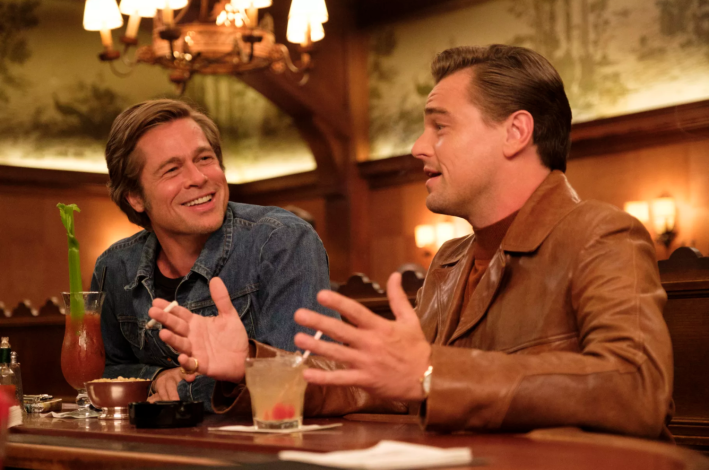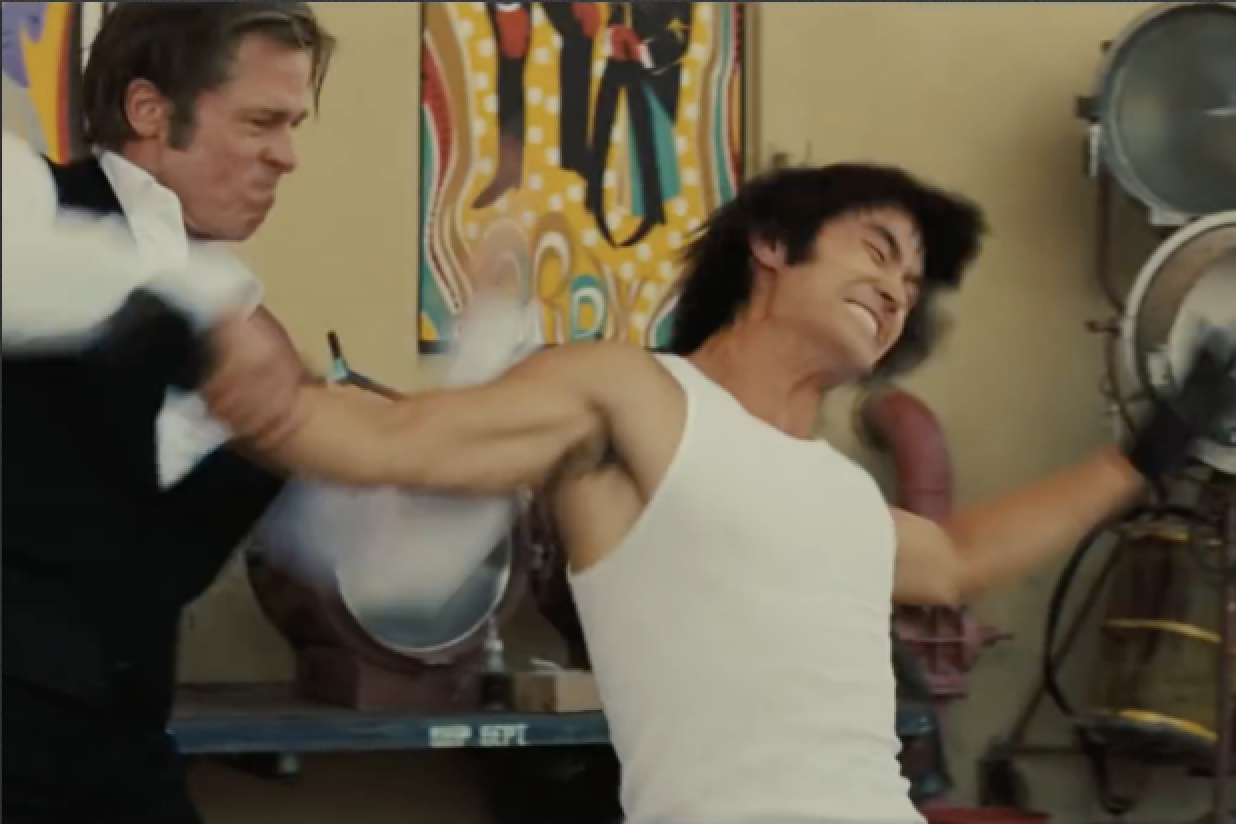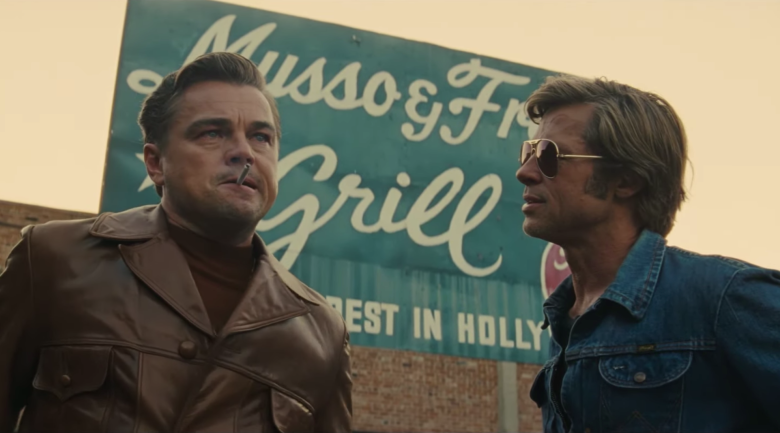The following contains spoilers for Quentin Tarantino’s “Once Upon a Time … in Hollywood.”
There was a moment in Once Upon a Time … in Hollywood when Leonardo DiCaprio’s character Rick Dalton is crying at the valet station at Musso & Frank. Brad Pitt’s character Cliff Booth covers him up with sunglasses and says, “Don't cry in front of the Mexicans.” And us, the Mexicans sitting in the sold-out movie theater Thursday night, cheered like we were watching our niece graduate from Stanford.
The moment underscored both the genius of the film’s structure and one of its running themes about the ways the film and TV industry were complicit in marginalizing Mexicans and subsequently all Latinx peoples.
Quentin Tarantino’s Once Upon a Time In Hollywood is a long twisting ode to westerns and the business of westerns. And a fable that seems to create three parallel worlds: the “real world” in which the story is set, the magical world of movies and T.V. that are interwoven throughout like plays within the play, and our world as audience members taking it all in. And throughout all this, there is that inescapable truth that the industry town that’s nearly 50 percent Latin American has a long history of whitewashing, appropriating, and ignoring them.
RELATED: Video: Leonardo DiCaprio Prefers Pupusas Over Tacos

The valet scene that happens early on in the film, for example, is such a meta-joke. The Mexicans Leo’s crying in front of aren’t just the valets in the film or the actors playing the valets. It’s us. One-fourth of all movie tickets sold are sold to brown people. And yet we often fail to see true representation on the silver screen. A fact punctuated by a viral video of the stars of this movie talking about tacos and pupusas at a marketing junket.
A few scenes later, DiCaprio’s character Rick Dalton, a Missourian cowboy, is rehearsing some line for a T.V. pilot he’s going to film in the morning. His rehearsing partner is himself pre-recorded on a tape deck. It goes something like this: Dalton says a line like “Come on in, Madrid.” Then pre-recorded Dalton says “Spanish. Spanish. Spanish.” And then another line.
See, the pilot he’s filming in the morning is for a T.V. show about a Mexican gunslinger named Madrid played by a white guy named James Stacy played by Timothy Olyphant. Eventually, we see this “Spanish. Spanish. Spanish.” interaction with the actual words being stuff like hombre, tamales, mole, frijoles. Even full Spanish phrases.
RELATED: ‘Black Panther’ and ‘Coco’ Prove Diversity Is Good for the Movie Business, Panel Says

The layering is kind of insane. Olyphant is probably best known for playing real-life lawman Seth Bullock in HBO’s Deadwood. The actor he’s playing in this film, James Stacy, is best known for his role as the half-Mexican Johnny Madrid Lancer. In that show, Madrid’s full-white brother (played here by the late Luke Perry) Stacy Lancer is an educated former army man to contrast with Madrid’s outlaw gunslinger. Um … que?
The idea of the western itself forgets that cowboys were vaqueros, that Spanish haciendas were actually Mexican ranchos, and that chili is actually chile.
Like I don’t even know what’s happening other than none of those dudes is actually Mexican, Latinx, or even from Madrid. Yet, here they are––the only representation of my culture across all generations of Hollywood.
The weird parallels continue later in the film when Brad Pitt and Leonardo DiCaprio have a margarita party at the Valley landmark Casa Vega while Margot Robbie—who does wonderful work as Sharon Tate—and her group of friends have a little dinner party of their own at El Coyote, a 90-year-old Mexican restaurant in the Fairfax district where Tate, Jay Sebring, Abigail Folger, and Wojciech Frykowski had their last meals before being murdered by the Manson family.
Tragedy aside, the parallelogram that is this movie seems uncomplicated in its message about how Hollywood has always rewritten history and in our case to erase or villainize us. Remember The Alamo?
RELATED: Restaurant Guide: Casa Vega

The idea of the western itself forgets that cowboys were vaqueros, that Spanish haciendas were actually Mexican ranchos, and that chili is actually chile. Shit, there was a modern western from 2001 called The Mexican that stars Brad Pitt and Julia Roberts. The “Mexican” in that was a gun.
In this film, Brad’s and Leo’s characters are the late Hollywood starlet’s margarita-loving next-door neighbors. And the only person of color with a prominent role in this movie is Asian American actor Mike Moh who plays the legendary Bruce Lee. Lee, who himself was often the only person of color on the screen, was early on a suspect in Tate’s murder thanks in large part to the suspicions of her husband, disgraced director Roman Polanski. But that’s a whole other racist rabbit hole.
At least we got to see Bruce portrayed as part of Hollywood’s heyday. At least we got to see Clifton Collins Jr. in a cameo. At least we got to see Leo cry in front of all us Mexicans. The point is representation matters. It has always mattered, to the audience at least.







